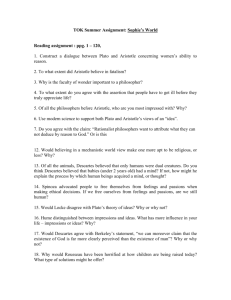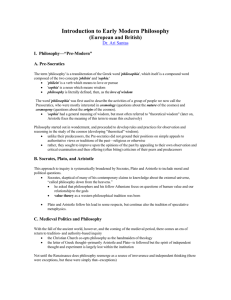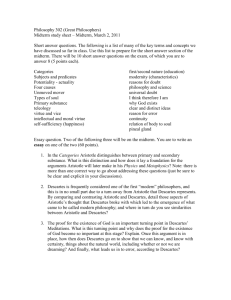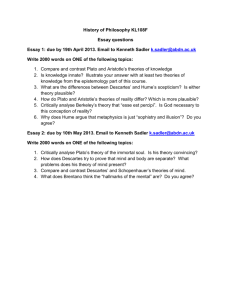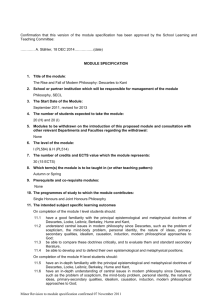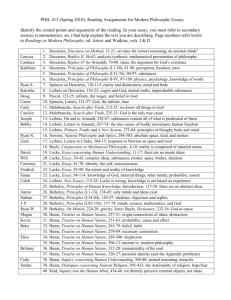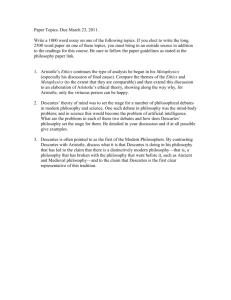Introduction to Philosophy
advertisement
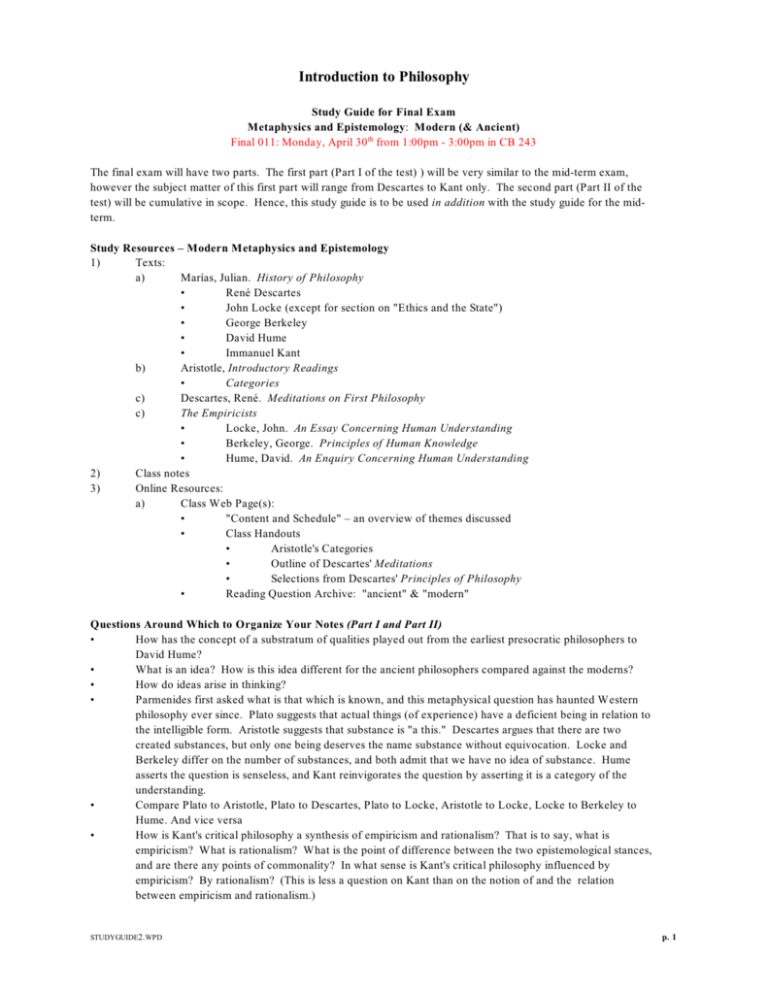
Introduction to Philosophy Study Guide for Final Exam Metaphysics and Epistemology: Modern (& Ancient) Final 011: Monday, April 30 th from 1:00pm - 3:00pm in CB 243 The final exam will have two parts. The first part (Part I of the test) ) will be very similar to the mid-term exam, however the subject matter of this first part will range from Descartes to Kant only. The second part (Part II of the test) will be cumulative in scope. Hence, this study guide is to be used in addition with the study guide for the midterm. Study Resources – Modern Metaphysics and Epistemology 1) Texts: a) Marías, Julian. History of Philosophy • René Descartes • John Locke (except for section on "Ethics and the State") • George Berkeley • David Hume • Immanuel Kant b) Aristotle, Introductory Readings • Categories c) Descartes, René. Meditations on First Philosophy c) The Empiricists • Locke, John. An Essay Concerning Human Understanding • Berkeley, George. Principles of Human Knowledge • Hume, David. An Enquiry Concerning Human Understanding 2) Class notes 3) Online Resources: a) Class Web Page(s): • "Content and Schedule" – an overview of themes discussed • Class Handouts • Aristotle's Categories • Outline of Descartes' Meditations • Selections from Descartes' Principles of Philosophy • Reading Question Archive: "ancient" & "modern" Questions Around Which to Organize Your Notes (Part I and Part II) • How has the concept of a substratum of qualities played out from the earliest presocratic philosophers to David Hume? • What is an idea? How is this idea different for the ancient philosophers compared against the moderns? • How do ideas arise in thinking? • Parmenides first asked what is that which is known, and this metaphysical question has haunted Western philosophy ever since. Plato suggests that actual things (of experience) have a deficient being in relation to the intelligible form. Aristotle suggests that substance is "a this." Descartes argues that there are two created substances, but only one being deserves the name substance without equivocation. Locke and Berkeley differ on the number of substances, and both admit that we have no idea of substance. Hume asserts the question is senseless, and Kant reinvigorates the question by asserting it is a category of the understanding. • Compare Plato to Aristotle, Plato to Descartes, Plato to Locke, Aristotle to Locke, Locke to Berkeley to Hume. And vice versa • How is Kant's critical philosophy a synthesis of empiricism and rationalism? That is to say, what is empiricism? What is rationalism? What is the point of difference between the two epistemological stances, and are there any points of commonality? In what sense is Kant's critical philosophy influenced by empiricism? By rationalism? (This is less a question on Kant than on the notion of and the relation between empiricism and rationalism.) STUDYGUIDE2. WPD p. 1 Conceptual or Thematic Knowledge Objective: Below are listed a number of concepts with which you should be familiar. This list is organized by philosopher. That a concept or theme is listed under one philosopher and not another is not meant to suggest it is irrelevant to others. The organizational framework presented here is purely heuristic. Bear in mind that the list is not exhaustive. In part I, you will be asked to complete two short answer questions (10-15 minutes each) that will test your understanding of these concepts/themes. Each question will concern one of these concepts/themes. It may concern a single philosopher or more than one. You may be asked (i) to identify the philosophers who wrote on this topic, (ii) the importance of this concept in their philosophy, (iii) the way this concept includes within it other concepts or is, itself, an aspect of a more general concept, and/or (iv) the historical influences that led to or shaped this concept or, conversely, the influence this concept has had on later philosophers in the ancient period. In other words, your job is to explicate – albeit briefly – the significance of the chosen concept in the history of the modern study of metaphysics and epistemology. General • • • • empiricism epistemology metaphysics rationalism Descartes Locke • • • • • • • • • • • • Berkeley • • • • • • • • cogito ergo sum doubt, method of idea(s) • definition • clear and distinct • origin intuition light of nature proofs for the existence of God representational (resemblance) theory of perception (or knowledge) sensation substance(s) Hume Author of Nature idea(s) • abstract ideas vs. general words • nonexistence of abstract ideas • origin of the simple ideas of sensation esse is percipi extent of knowledge mind, spirit, soul qualities, primary and secondary substance uniformity of nature STUDYGUIDE2. WPD • • • • experience extent of knowledge idea(s) • simple and complex • origin qualities, primary & secondary representational theory of perception (or knowledge) substance(s) • • • Kant association of ideas perceptions • impressions & ideas • simple & complex objects of human reason • relations of ideas • matters of fact • causation vs. custom or habit uniformity of nature • • • • • experience knowledge • a priori • a posteriori judgment • analytic • synthetic powers of the mind: • sensibility • understanding pure categories of the understanding (categories) p. 2 Part I: Essay Question (Descartes to Kant) Objective: You will be asked to answer one of these questions on the exam. Be sure that you answer the entire question to receive full credit. Think of each lettered section of the question [(a), (b), (c), etc.] as at least one paragraph of the essay. 1) (A) What are the various classes of ideas according to Descartes? Provide an example of each. (B) Why cannot I be the source of the idea of God according to Descartes? (C) What is the manner by which Locke characterizes the mind, and how does Locke say the mind acquires ideas ? (D) Lastly, though Descartes and Locke may disagree about the origin of ideas, do they agree or disagree (generally speaking) what an idea is and the role it plays in knowledge? 2) (A) What is substance according to Descartes, and what are its different kinds? (B) What is substance according to Locke?, and based on his epistemology how many kinds of substances generally would he assert exist? (C) How many kinds of substance does Berkeley assert exist, and why is this different than Locke? (D) Why is the word "substance" a meaningless term according to Hume? 3) (A) How does Descartes conceive of God, and how does he (first) prove the existence of God simply from the idea of such a being? (B) How does Locke conceive of God, and how does he prove the existence of God (C) How does Berkeley conceive of God? Does he offer a proof for the existence of God, and if so, what is this? (D) How does Hume conceive of God? Does he offer a proof for the existence of God, and if so, what is this? Part II: Essay Questions (Cumulative in Scope) Objective: You will be asked to answer both of these questions on the exam. Be sure that you answer the entire question to receive full credit. Think of each lettered section of the question [(a), (b), (c), etc.] as at least one paragraph of the essay. 1. A) In Aristotle's theory, what is substance? (B) Explain the most important difference(s) between the Aristotelian conception of substance as defined above and the Platonic theory of Forms. (C) How does Descartes assimilate Aristotle's definition of substance into his philosophy? (D) Lastly, why does Locke both accept the notion of substance but reject the claim that we can have an idea of it? 2. (A) Plato asserts that the human soul apprehends ideas which do not arise from experience. How does this he explain this? (B) Does Aristotle agree or disagree with Plato on this point, and correspondingly how does Aristotle characterize the manner by which the intellect apprehends ideas, i.e., how does the intellect come to be affected and consider the forms of things? (C) Does Descartes have a greater affinity with Plato or Aristotle on this point? In order to answer this point, address the issue of how the mind comes to have the idea of God according to Descartes. (D) Lastly, what is the origin of every idea according to David Hume, and how does Hume then account for the idea of God in his philosophy? The Test Part I: 2 short answer questions • spend 10 to 15 minutes on each 1 essay question • spend 20 to 30 minutes on Part II: 2 essay question • spend 20 to 30 minutes on each The test is not open note. However, you can do much to prepare in advance. First, organize your notes conceptually. That is, order the list of concepts by reference to each philosopher and the guiding influence this concept in or over the history of the ancient period. Write out brief "definitions" for each. Second, write out an outline, if not a complete essay, for each of the essay questions. Bring a BLUE BOOK on the day of the exam. Students who fail to bring one will receive a 3% deduction. STUDYGUIDE2. WPD p. 3
